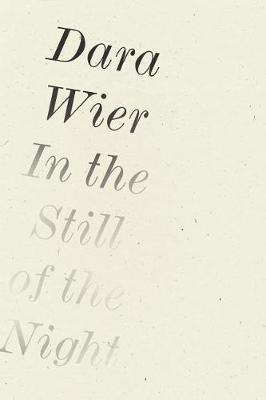|
In the Still of the Night by Dara Wier (Wave Books, 2017)
Review by Greg Bem (@gregbem) See here this is all it means to be dead-- to be no longer living and to be both never and always as never before and after. From “That’s What the Dead Do” At first glance, in so many cases, a poetry that sits on the page looking still and unmoving also appears quick and fleeting. There is the act of the poetic disappearance. Poems that have short lines appear exquisite and completed with ease, ready to acknowledge and push off. The poem that is visibly minimal is disguised in our notions of access and maneuverability. These qualities may or may not be grounded in truth. Some poetry that spools down, appears as a cascade of text in short but impactful drips and smears, is designed to do this. Our notions of this flight, this passing of time through the poem's form, are occasionally satisfied. Yet no further from this quality of quickness, this quality of passage, is Dara Wier’s In the Still of the Night. In her recent collection, the poetry is as dense and protected as a series of stone glyphs. It is as enduring as a caustic wound. It is the silence of the active world before, during, and beyond a single, enticing sigh. The lines are short, but they resonate, reverberate, and stick around for an endured presence. Wier’s work in this book is exciting and challenging. It is the quixotic beyond the glossy surface. It is the essence of fullness within the stillness alluded to in the book’s title. It is a seducing mixture of the mental and the emotional, grounded in a seeking of the stated truth, the analytical. There is cunning in this book, which contends with the process of the poems themselves, slickly cut into the pages. This process creates a slow, ambient crawl for the readers who seek to energetically read through the poems to the revelatory core gently sitting beneath. There is exhaustion here, an imposition from the poet through the poet’s own process. Process is the thoughts and feelings that allow us to live, that lead us through reflection and autonomy to greater choice and elevated existence. I say there’s confetti floating from my mouth and I have to pause a little to admire how good confetti can be as it floats out gently on waves of air From “The Dream” Books like In the Still of the Night are often pulled together through obvious themes. The ideas that compose this book are radically elastic, stretching across mind states and incredible experiences. There is a broad brush of image cast within the book that leads the poems to cover ecstatic differences in environments, characters, objects, and moments. And yet the book maintains its course as one that has been designed with the weight (and wait) of inquiry. There is a striking juxtaposition between profession and prophecy within Wier’s writing that feels homely and yet also educational. These poems are positioned into intimacy but also contain a language of modeling, sketching, advising. The core of representation within these poems is one of truthfulness. Inspiration is an incredible core working well to maintain its nightly cues. For there is a recharging, a resting, a rebounding of the night that instills a sense of growth, satisfaction, and contentment from poem to poem. It is the sigh as acknowledgment. It is the sigh as appreciation. It is the sigh as the token of experience. The blossoming pear trees invade the city, and the plums, and the other white blossoms that lead to nowhere and nothing. From “Free Will” The world that exists in the poet’s reality is a world of perceived transience and transformation. It is a world of life and death. It is a world of conclusion. Observation, observed by the poet, becomes the guide to truth itself. As we explore our worlds we will find resolution. There is an overwhelming pressure to relate Wier’s works with the ideas of centered self of the most famous 20th Century existentialists, and, perhaps contentiously, with the detachment of many Buddhist teachings. This pressure is rooted in the conclusive, stable space that we arrive to after conflict, struggle, and exhaustion. And yet Wier’s work is ultimately also one that is beyond the poet at times, one that is deterministic, even, with more untouchable universal laws and reasoning arriving around each breath. It is also a work that is filled with attachments to the value of the beauty of this world of revelation. As a collection it reflects significant moments of conversation and active exploration, which arrive to the eruption or arousal of moments following the processes of examination. To be with the poet during these transformative iterations is not universal of poetry, but, as presence, it is an intention that exists and is attempted in many poems in many cultures. Wier’s work successfully invites the reader into the process, while also explicating the results before, during, and after. This is the power of the glyph. Of the burn. Of the sigh. There is the wonder that it exists as action and the wonder of context that surrounds the action. Wier’s work is thus one of itself and that which led to its creation. The effects are stunning, filled with awe, and assuredly will impact many readers and many types of readers. as paths cross with any place we’re in we believe we can never leave From “Autophagy Irrespective”
0 Comments
Your comment will be posted after it is approved.
Leave a Reply. |
Welcome to Yellow Rabbits. Thanks for visiting.
All reviews by Greg Bem unless marked otherwise.
SearchYellow Rabbits Reviews
Archives by Month
August 2019
|

